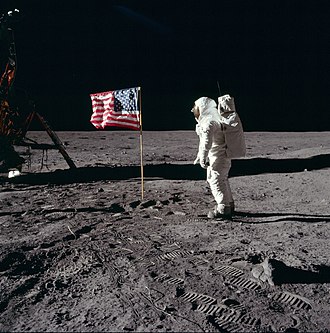Space colonization






Space colonization refers to the hypothetical permanent human habitation and exploitation of natural resources off the planet Earth. It is a subject that combines elements of astronomy, space exploration, engineering, biology, environmental science, and political science to explore the possibilities and implications of humans living in space. The concept of space colonization has been a staple of science fiction for decades but has increasingly become a topic of serious scientific investigation and debate in recent years.
Motivations[edit]
The motivations behind space colonization are varied and include scientific research, the survival of humanity, economic benefits, and the expansion of human presence beyond Earth. The finite nature of Earth's resources and the growing concerns about global catastrophes, such as asteroid impacts or ecological collapse, drive the argument for establishing human colonies in space as a means of ensuring the long-term survival of the human species.
Challenges[edit]
Space colonization presents numerous challenges, including the technological hurdles of space travel, the physiological and psychological effects of living in space, and the economic costs associated with launching and maintaining colonies. The harsh environments of space and other celestial bodies, such as high levels of radiation, microgravity, and the absence of air and water, require significant advancements in space habitat design, life support systems, and protective technologies.
Potential Locations[edit]
Several potential locations for human colonization have been identified within our solar system, including the Moon, Mars, and the moons of the outer planets, such as Europa (a moon of Jupiter) and Titan (a moon of Saturn). Each location presents its own set of challenges and advantages for human colonization.
The Moon[edit]
The Moon is considered a prime candidate for the first human colony outside of Earth due to its proximity. The challenges include its lack of atmosphere, extreme temperature variations, and lower gravity compared to Earth. However, its resources, such as water ice in permanently shadowed craters and potential for solar power, make it an attractive option.
Mars[edit]
Mars has been the focus of colonization discussions due to its relatively Earth-like characteristics, such as day length, surface features, and the presence of water ice. The challenges of colonizing Mars include its thin atmosphere, composed mostly of carbon dioxide, and the need for protection from solar and cosmic radiation.
Outer Planet Moons[edit]
Moons like Europa and Titan offer unique scientific opportunities and resources, such as water ice and organic compounds. However, their great distance from Earth and harsh surface conditions pose significant challenges for human colonization.
Technological and Ethical Considerations[edit]
The advancement of space technology is crucial for overcoming the challenges of space colonization. This includes the development of reliable and efficient propulsion systems, life support and habitat modules, and technologies for in-situ resource utilization (ISRU). Ethical considerations also play a significant role in discussions of space colonization, including concerns about the potential contamination of pristine worlds, the exploitation of space resources, and the rights and governance of extraterrestrial colonies.
Conclusion[edit]
Space colonization remains a complex and multifaceted challenge that requires advancements in technology and international cooperation. Despite the significant hurdles, the potential benefits of space colonization for scientific research, resource exploitation, and the long-term survival of humanity continue to drive interest and investment in this ambitious endeavor.

This article is a space- or spaceflight-related stub. You can help WikiMD by expanding it!
Ad. Transform your life with W8MD's Budget GLP-1 injections from $75


W8MD offers a medical weight loss program to lose weight in Philadelphia. Our physician-supervised medical weight loss provides:
- Weight loss injections in NYC (generic and brand names):
- Zepbound / Mounjaro, Wegovy / Ozempic, Saxenda
- Most insurances accepted or discounted self-pay rates. We will obtain insurance prior authorizations if needed.
- Generic GLP1 weight loss injections from $75 for the starting dose.
- Also offer prescription weight loss medications including Phentermine, Qsymia, Diethylpropion, Contrave etc.
NYC weight loss doctor appointmentsNYC weight loss doctor appointments
Start your NYC weight loss journey today at our NYC medical weight loss and Philadelphia medical weight loss clinics.
- Call 718-946-5500 to lose weight in NYC or for medical weight loss in Philadelphia 215-676-2334.
- Tags:NYC medical weight loss, Philadelphia lose weight Zepbound NYC, Budget GLP1 weight loss injections, Wegovy Philadelphia, Wegovy NYC, Philadelphia medical weight loss, Brookly weight loss and Wegovy NYC
|
WikiMD's Wellness Encyclopedia |
| Let Food Be Thy Medicine Medicine Thy Food - Hippocrates |
Medical Disclaimer: WikiMD is not a substitute for professional medical advice. The information on WikiMD is provided as an information resource only, may be incorrect, outdated or misleading, and is not to be used or relied on for any diagnostic or treatment purposes. Please consult your health care provider before making any healthcare decisions or for guidance about a specific medical condition. WikiMD expressly disclaims responsibility, and shall have no liability, for any damages, loss, injury, or liability whatsoever suffered as a result of your reliance on the information contained in this site. By visiting this site you agree to the foregoing terms and conditions, which may from time to time be changed or supplemented by WikiMD. If you do not agree to the foregoing terms and conditions, you should not enter or use this site. See full disclaimer.
Credits:Most images are courtesy of Wikimedia commons, and templates, categories Wikipedia, licensed under CC BY SA or similar.
Translate this page: - East Asian
中文,
日本,
한국어,
South Asian
हिन्दी,
தமிழ்,
తెలుగు,
Urdu,
ಕನ್ನಡ,
Southeast Asian
Indonesian,
Vietnamese,
Thai,
မြန်မာဘာသာ,
বাংলা
European
español,
Deutsch,
français,
Greek,
português do Brasil,
polski,
română,
русский,
Nederlands,
norsk,
svenska,
suomi,
Italian
Middle Eastern & African
عربى,
Turkish,
Persian,
Hebrew,
Afrikaans,
isiZulu,
Kiswahili,
Other
Bulgarian,
Hungarian,
Czech,
Swedish,
മലയാളം,
मराठी,
ਪੰਜਾਬੀ,
ગુજરાતી,
Portuguese,
Ukrainian